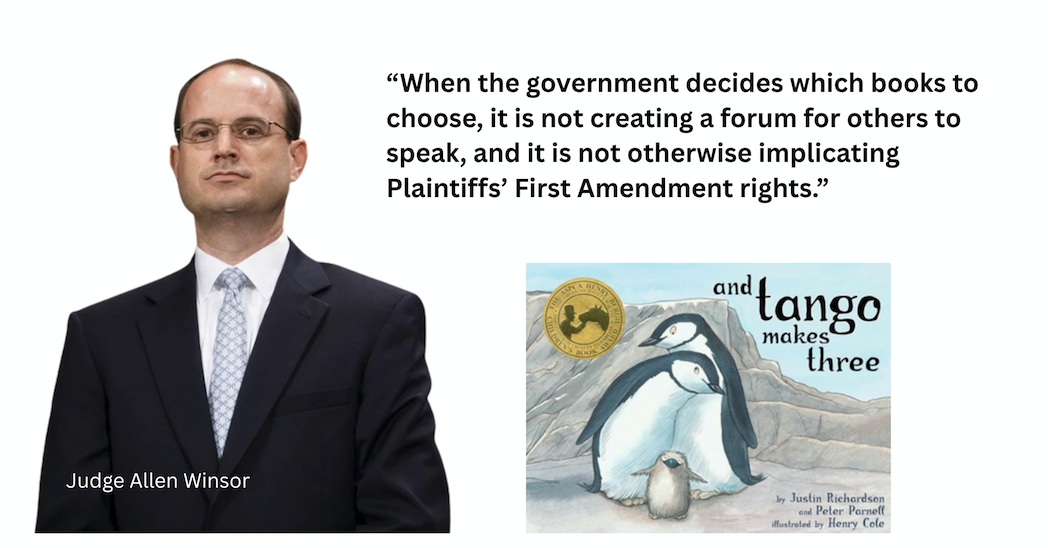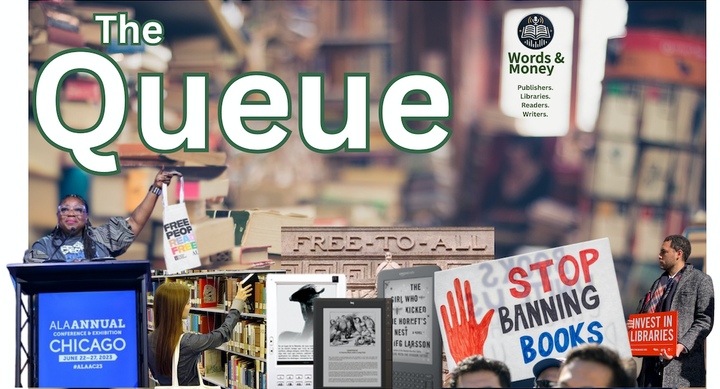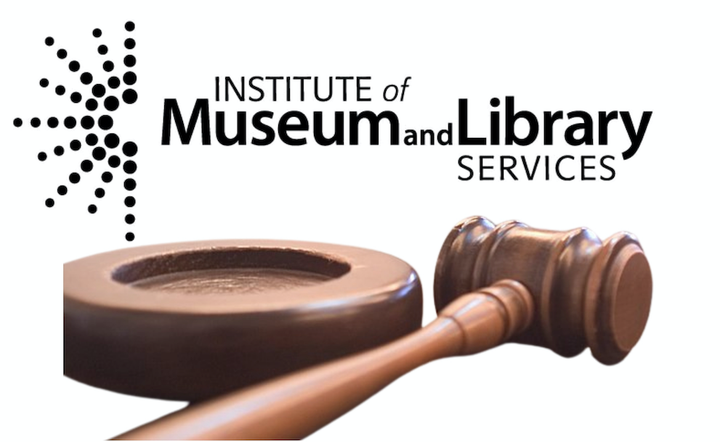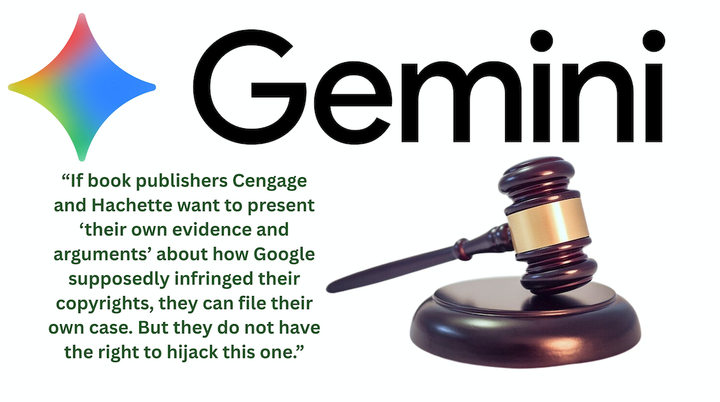In a Setback for the Freedom to Read, Florida Court Finds 'No First Amendment Right to Receive Information' in Libraries
In an 18-page ruling, judge Allen Winsor stopped short of finding that library book selection is government speech, but agreed that Escambia County officials have unfettered power to ban books they disagree with.

On the eve of Banned Books Week 2025, a Florida court has delivered a potentially significant blow to libraries and the freedom to read.
In a September 30 opinion and order, federal judge Allen Winsor, a Trump appointee, held that there is no First Amendment right to receive information in libraries, a decision that—if it stands on appeal—would give politicians unchecked power to ban books at will from Florida school libraries.
The decision comes in a 2023 lawsuit led by authors Peter Parnell and Justin Richardson, whose bestselling 2005 picture book And Tango Makes Three, about two male penguins who raise a penguin chick, was removed from Escambia County school library shelves based on what the authors allege was unconstitutional, anti-LGBTQ+ “viewpoint discrimination.”
In dueling summary judgment motions filed last November, the author plaintiffs argued that the book was admittedly banned “because Tango depicts a same-sex relationship, a viewpoint-discriminatory justification prohibited by the First Amendment.”
But lawyers for Escambia County countered that because library book selection is “government speech,” public officials have the discretion to remove any book from library shelves for any reason, “free from forum analysis or the viewpoint-neutrality requirement.”
In his 18-page ruling, Winsor stopped short of finding that library book selection is government speech, but agreed that Escambia County officials have the unfettered power to ban books.
“The board’s lead argument is that school library curation does not implicate any students’ or authors’ First Amendment rights at all. Thus, the argument continues, even if the board removed a book based on its viewpoint, the removal would not be unlawful. I agree, and that is enough to resolve this case,” Winsor concluded.
Notably, Winsor leaned heavily on a recent en banc decision by the U.S. Court of Appeals for the Fifth Circuit in Little v. Llano County, which found that there was no right First Amendment right to receive information in libraries. And while the judge appeared to accept the idea that library book selection is “government speech,” extensively citing from the Fifth Circuit’s opinion on the matter and calling it “persuasive,” even though only a non-binding plurality of the appeals court held that view, he dodged the issue in his final opinion.
“The good news is I need not decide the difficult government speech issue to resolve the case. If book curation is government speech, the board wins on the merits because the First Amendment would not reach its speech,” the judge held. “And even if book curation is not government speech, the board still wins on the merits: when the government decides which books to choose, it is not creating a forum for others to speak, and it is not otherwise implicating Plaintiffs’ First Amendment rights. Either way, the First Amendment offers Plaintiffs no protection, and the board is entitled to summary judgment.”
Despite Winsor leaning heavily on the Fifth Circuit’s decision in Little v. Llano County in his decision, the idea of expanding government control over library collections, particularly through expanding the government speech doctrine, has been largely been rejected by the courts. In several cases, including challenges in Texas, Iowa, and Arkansas, courts have held that libraries are meant to collect a diverse array of books and recognized that giving politicians nearly unfettered power to erase people, subjects, and ideas they don’t approve of would radically transform libraries from engines of inquiry into mere mouthpieces for the state.
But in its shock decision delivered in May, which overturned a non-controversial 30-year precedent, the Fifth Circuit, widely considered to be the most conservative court in the nation, delivered an alternative, and library professionals say inaccurate, view of how libraries work:
"Library shelves are not a community bulletin board: they are not places set aside for public expression of particular kinds or by particular groups. If they were, libraries would have to remain viewpoint neutral when choosing books. That would be absurd," the Fifth Circuit held. "Libraries choose certain viewpoints (or range of viewpoints) on a given topic. But they may exclude others. A library can have books on Jewish history without including the Nazi perspective. Forum analysis has no place on a library’s bookshelves."
Raising the Stakes
Notably, Winsor’s decision comes after officials in neighboring Nassau County settled similar claims with the plainitff authors in September 2024, acknowledging that the book contains no obscene material and agreeing to return it to school library shelves along with several other banned titles.
Furthermore, Escambia County officials still face a separate lawsuit over the removal of books from school library shelves.
First filed on May 16, 2023 in the Northern district of Florida in Pensacola by Penguin Random House, PEN America, and a group of authors and parents, that suit alleges that administrators and school board members “disproportionately” targeted books by “non-white and/or LGBTQ+ authors” and books that contain “themes or topics” related to race or the LGBTQ+ community. The complaint lays out in detail how a single language arts teacher at a local high school—Vicki Baggett—kicked off what the plaintiffs describe as "a widespread—and largely successful—campaign to restrict access to books” throughout the Escambia County School District.
Winsor’s decision also comes just weeks after another Florida court delivered a massive win for freedom to read advocates by striking down parts of a controversial new state law, HB 1069, which banned all books with sexual content in Florida school libraries.
In that case, Judge Carlos E. Mendoza expressed skepticism about the state’s government speech argument. However, the case against HB 1069 differs somewhat from the case over the removal of And Tango Makes Three because it involved what Mendoza found to be an unconstitutionally broad “blanket” ban on speech.
The case over HB 1069 is now on appeal before the 11th Circuit—where the case over Tango is almost certainly heading as well.
More broadly, Winsor’s decision represents another step on the path to a potentially massive Supreme Court showdown over book bans that could dramatically impact the future of libraries.
At oral arguments in Little v. Llano County, plaintiff attorney Matthew Borden highlighted what’s at stake should the courts find that elected politicians hold unlimited power to determine what books can go on—or be banned—from library shelves.
"The First Amendment prevents the government from getting rid of ideas that it disagrees with,” Borden argued. But should the courts ultimately ratify the idea that there is no First Amendment right to receive information in libraries, he continued, it "would turn libraries from institutions of knowledge and education and learning and ideas into political institutions."


